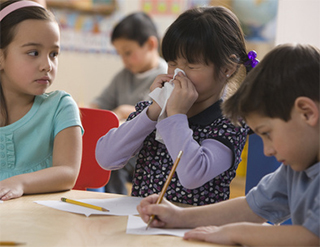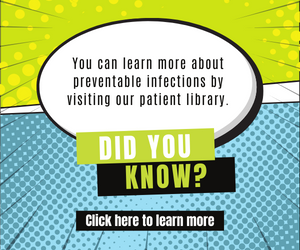Survive Flu Season, Even in a Crowd

Autumn can bring a surge of infectious illnesses, especially when people gather in enclosed spaces like school, the mall and public transit. Every autumn, we begin to fear the flu. This contagious respiratory infection is caused by the influenza virus, which evolves and may bring new strains into circulation.
We are exposed to various strains of the influenza virus many times in the course of our lives. Previous bouts of flu may help protect against similar strains of the virus, although a radically different strain of influenza A is known to emerge three to four times every 100 years. Depending on the flu strain and severity of a flu season, 2,000 to 8,000 Canadians can die of influenza and its complications annually.1 Getting an annual flu shot is your family’s best defence against this contagious and potentially serious illness.2
The flu comes on fairly quickly and generally starts with headache, chills and cough, along with a sore throat, fatigue, aching muscles and joints and, in some people, fever. A runny nose, sneezing and watery eyes are also common symptoms and produce the respiratory droplets that help spread the virus. Nausea, vomiting and diarrhea may also occur, most often in young children.1
Protect yourself and your family against infectious respiratory illness by practicing simple hygiene measures every day, year round. Remember that you can’t always tell if someone has an infectious illness—the influenza virus can spread to others beginning a day before the symptoms appear,2 and it remains contagious for five to 10 days after the symptoms develop. This infectious period may begin earlier and last longer in young children and in adults with compromised immune systems who get the flu.3
Teach your children—by example as well as by explanation—to always cover the mouth and nose when coughing or sneezing. Use a tissue or the bend of the elbow.2 It’s about more than good manners. These germs can travel at least one meter and can contaminate the surfaces they land on.3 People who are ill should stay at home if possible and avoid close contact with others.2 Everyone can do their part to help prevent the spread of infection.
Prepare your family to stay healthy as the winter season approaches:
- Boost resistance by eating healthy, staying physically active and getting enough rest.
- Don’t share food, utensils, or personal items that come in contact with your face, such as makeup, pillows and towels.
- Wash your hands: before and after coughing, sneezing or touching your mouth, nose or eyes; before preparing or eating food; after spending time in a public place or visiting someone who is ill.2
A healthy family means a healthier community.
Brought to you by vaccines411.ca – know where to go for your vaccinations.
This information should not be used as a substitute for the medical care and advice of your doctor. There may be variations in treatment that your physician may recommend based on individual facts and circumstances.
Read more Vaccines411® Articles 
Sources
Note: the hyperlinks that direct to other sites are not continuously updated. It is possible that some links become untraceable over time. Thank you.
- Influenza - Infectious Diseases - Public Health Agency of Canada.
http://www.phac-aspc.gc.ca/influenza/ - How to Prevent Colds and Other Contagious Illnesses
http://www.webmd.com/cold-and-flu/cold-guide/keeping-catchy-infections-contained - CDC - Seasonal Influenza (Flu) - ACIP Recommendations: Introduction and Biology of Influenza
http://www.cdc.gov/flu/professionals/acip/clinical.htm



